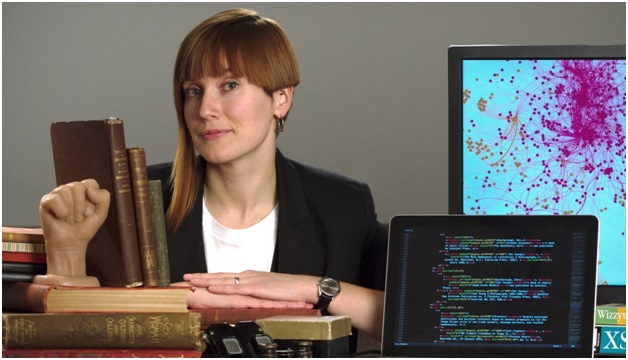Constance Crompton is project leader on a project funded through the Canada Foundation for Innovation’s John R. Evans Leaders Fund. She will be attending the 2015 Congress of the Humanities and Social Sciences to present as part of a panel called “From Documents to Data” at the Canadian Society for Digital Humanities conference tomorrow, Tuesday, June 2. This article originally appeared on Innovation.ca in January 2015.
This past year, the Biblioteca Apostolica Vaticana, or Vatican Library, famously began to digitize its vast and remarkable archive that includes the original La Divina Commedia by Dante Alighieri and the Gutenberg Bible. Eventually, the secular world will have access to the Vatican’s rarefied collection of 82,000 manuscripts.
Constance Crompton, a 33-year-old digital humanities assistant professor at the University of British Columbia’s Okanagan campus in Kelowna, has embarked upon a similar digitization project. A new recipient of the Canada Foundation for Innovation’s John R. Evans Leaders Fund, Crompton’s research project, titled “The Exchange: A Humanist Data Lab,” joins the past with the present through digitization.
This May, Crompton’s specialized computer lab will allow her and a team of digital humanist researchers to embark upon the creation of cutting-edge encoding of historical materials. Although the process of coding itself will be highly complex, the end result will allow anyone with an interest in Crompton’s area of study easy access not only to text but also to user-friendly tools to find patterns both in and across previously obscure raw archival material, from 16th century Tudor court manuscripts to items related to the gay liberation movement of the 20th century. Similar to the Vatican, which rarely has allowed scholars access to its collection, many of the materials Crompton works with have been restricted to those who can travel to where books and ephemera are physically stored.
This project is a natural extension of Crompton’s early work. She graduated with a PhD from York University’s program of Communication and Culture, focusing on English literature. While a PhD student, she dived into a digitization initiative that wed her “love of history with computing.” This was the Yellow Nineties Online, which digitized and provided scholarly contextual material for 19th century periodicals that celebrated a variety of late-Victorian lifestyles. Crompton oversaw the digitization of this engaging body of work as project manager.
The common thread linking Crompton’s research, from Tudor court life to Victorian avant-garde literature, 20th century gay liberation press to 21st century legal texts, is how sex, gender and sexuality are represented. As might be expected, such issues, which embrace all permutations of sexuality, from homosexuality to transgender rights, can be hidden in euphemistic and historically specific language. Crompton’s challenge is to find and encode such information in a way that will allow computers and search engines to discover and connect it, allowing researchers, scholars and members of the public immediate access. In keeping with the democratic nature of the work, all the data digitized by Crompton’s Lesbian and Gay Liberation in Canada project — one of at least four research projects that will be carried out in the Exchange lab — will be donated to the Canadian Writing Research Collaboratory at the University of Alberta, which is encoding data about Canadian history dating back to the 1700s. The material will be on a platform that will allow online engagement between scholars, experts and students, allowing the sharing of insights and expertise, thus enriching the understanding of these obscure historical epochs. “If you can share history, it makes people more thoughtful; you can see how we got where we are and know that we can live in a different way or go in a different direction,” Crompton says.
Visit Innovation.ca for more stories about humanities and social science research supported by the Canada Foundation for Innovation (CFI). By funding state-of-the-art research infrastructure in all disciplines and across the full spectrum of research from discovery to applied, the CFI gives researchers the tools they need to think big and innovate.

